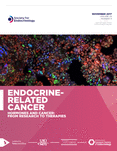Oncostatin M suppresses oestrogen receptor-α expression and is associated with poor outcome in human breast cancer
- 1Deeley Research Centre, BC Cancer Agency, 2410 Lee Avenue, 3rd Floor Research, Victoria, British Columbia, Canada V8R 6V5
2Department of Biochemistry and Microbiology, University of Victoria, Victoria, British Columbia, Canada V8W 3P6
3Department of Biochemistry and Medical Genetics, University of Manitoba, Winnipeg, Manitoba, Canada R3E 0V9
4Department of Pathology and Laboratory Medicine, University of British Columbia, Vancouver, British Columbia, Canada V5Z 4E3
- (Correspondence should be addressed to P H Watson at Deeley Research Centre, BC Cancer Agency; Email: pwatson{at}bccancer.bc.ca)
Abstract
The most important clinical biomarker for breast cancer management is oestrogen receptor alpha (ERα). Tumours that express ER are candidates for endocrine therapy and are biologically less aggressive, while ER-negative tumours are largely treated with conventional chemotherapy and have a poor prognosis. Despite its significance, the mechanisms regulating ER expression are poorly understood. We hypothesised that the inflammatory cytokine oncostatin M (OSM) can downregulate ER expression in breast cancer. Recombinant OSM potently suppressed ER protein and mRNA expression in vitro in a dose- and time-dependent manner in two human ER+ breast cancer cell lines, MCF7 and T47D. This was dependent on the expression of OSM receptor beta (OSMRβ) and could be blocked by inhibition of the MEKK1/2 mitogen-activated protein kinases. ER loss was also necessary for maximal OSM-induced signal transduction and migratory activity. In vivo, high expression of OSM and OSMR mRNA (determined by RT-PCR) was associated with reduced ER (P<0.01) and progesterone receptor (P<0.05) protein levels in a cohort of 70 invasive breast cancers. High OSM and OSMR mRNA expression was also associated with low expression of ESR1 (ER, P<0.0001) and ER-regulated genes in a previously published breast cancer gene expression dataset (n=321 cases). In the latter cohort, high OSMR expression was associated with shorter recurrence-free and overall survival in univariate (P<0.0001) and multivariate (P=0.022) analyses. OSM signalling may be a novel factor causing suppression of ER and disease progression in breast cancer.
- Revision received 9 December 2011
- Accepted 20 January 2012
- Made available online as an Accepted Preprint 20 January 2012
- © 2012 Society for Endocrinology












